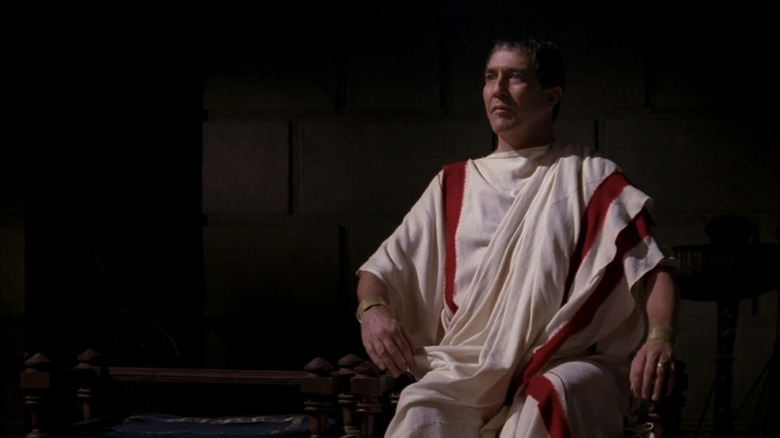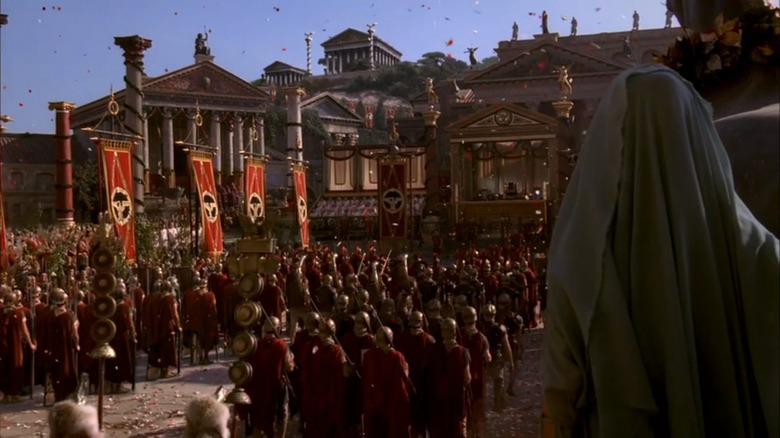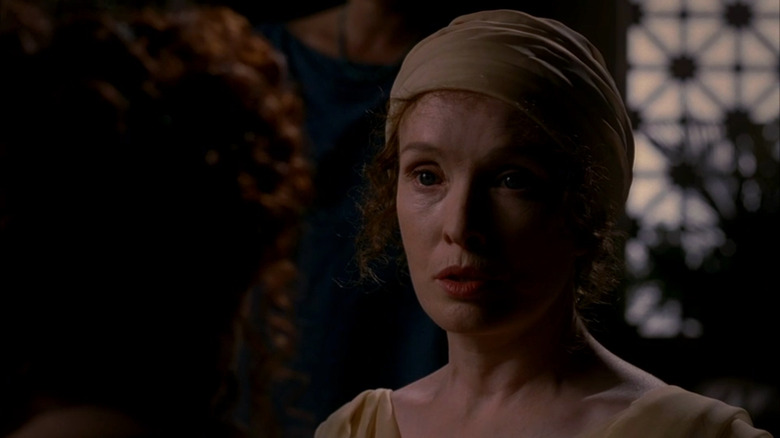Rome Showrunner Bruno Heller Never Thought HBO Would Actually Make The Series
The arrival of "Rome" in 2005 marked one of the most expensive productions of all time for its co-producers HBO and BBC. Its makers had grand plans. Set in the first century BCE, "Rome" would chart Ancient Rome's transition from being a republic to an empire — while taking us through the assassination of Julius Caesar, and the deaths of Mark Antony and Cleopatra. But the show lasted for two seasons out of a planned five, with about three seasons of story shoved into the second (and final) season. The reason? I've already brought it up — the budget.
The first season of "Rome" cost upwards of $100 million. That's about $8 million per episode. A lot of that money went toward the incredible sets and the amazing costumes. "Rome" showrunner Bruno Heller ("Gotham," "The Mentalist"), who had the task of planning out the five seasons, told Den of Geek in late 2020 that he was actually "cheap" for a writer as he was new then. What Heller is most surprised about is that the series ever got made.
'Very unlikely to be made'
Producing a series on the scale of "Rome" is an incredible undertaking. For one, it was shot in the Italian capital. On top of that, they wanted to create something closer to what a bustling city of that time would have been like. Remember, this is the first century BCE — so it's dirty, smelly, and very crowded. Bruno Heller told Den of Geek: "[Luckily,] every previous representation of Rome on any scale kind of went for the grand imperial late Edward Gibbon velvet drapes and marble columns. Even 'Gladiator' went for that. Whereas, in fact, it looked much more like Calcutta or Bombay and smelled like that."
Given all these challenges, Heller thought there was no way anyone could afford to make the series:
"It's one of those projects that's really going for broke and very unlikely to be made, [given] the budget that was required. They were paying me to write a script to take it at least to a respectable point at which time they can say, 'Okay, thank you.'"
Figuring out the series' roadmap, Heller added, was equivalent to "planning for a war, for a campaign. It's [like] invading Russia." Watching the series, which I've done several times now, you very much get the sense of what it was like. And in contrast to some of its big-budgeted successors, "Rome" gave us a look at what it was like for the working classes and the soldiers who weren't at the top of the food chain.
More about the psychology than the history
Despite how deep the research and the historical accuracy went, "Rome" wasn't trying to say that this is precisely what each character said in each moment. Ahead of the second season, Bruno Heller said in an article on HBO in 2007:
"We try to balance between what people expect from previous portrayals and a naturalistic approach ... This series is much more about how the psychology of the characters affects history than simply following the history as we know it."
As a fan, I can say that "Rome" gave me a deeper understanding of the time period than any book ever has. As a history buff, it also made me feel like I was right there in the middle of it all. I remember going to visit Rome in person and then firing up HBO for a rewatch once I was back home. Not for a single moment did it fail to live up to that first viewing — and it even provided context to my trip.
Unfortunately, in an era prior to "House of the Dragon" and "The Lord of the Rings: The Rings of Power," BBC found "Rome" too expensive to commit to all five seasons. With the co-producer out, HBO decided that season two would be its last. The final season was indeed overstuffed — and yet, it was utterly compelling.
Say what you like about giant budgets and whether or not a TV show should have them, "Rome" is a standout when held up to some of the top series. Even almost 20 years later, I feel a deep sadness that we didn't get the planned five seasons (and the talked about "Rome" movie that will never happen). Still, it was the gateway to big-budget prestige TV — "Game of Thrones" followed a few years later, kick-starting a whole new era — and I'm grateful for that.


